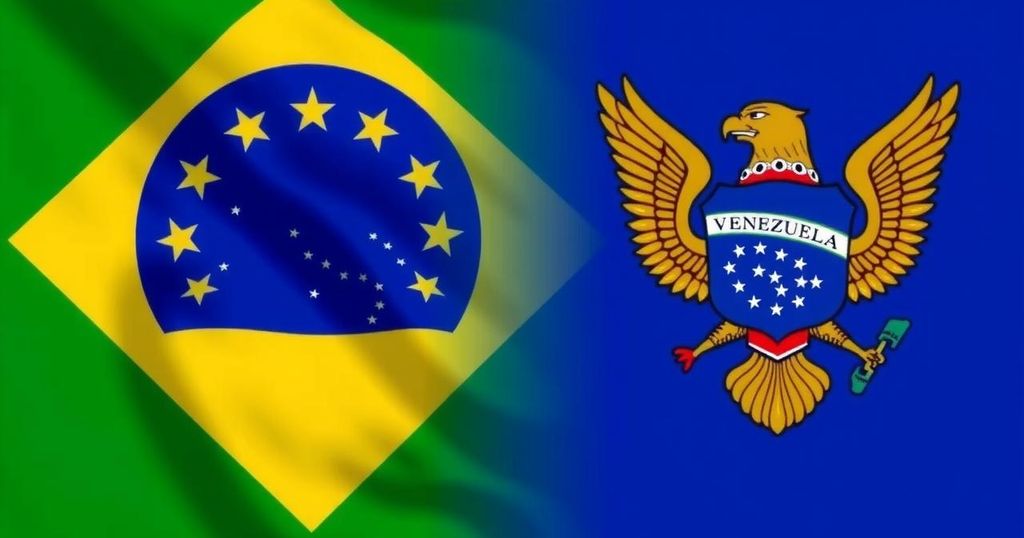Venezuela Recalls Ambassador to Brazil Amid BRICS Membership Controversy

Venezuela has recalled its ambassador from Brazil, blaming Brazilian officials for blocking its BRICS membership and making disrespectful remarks. This comes amid rising tensions following Maduro’s contested re-election and Brazil’s non-recognition of his presidency. The situation reflects deeper political unrest and diplomatic strife in South America.
Venezuela has made the decision to withdraw its ambassador from Brazil in response to tensions arising from its unsuccessful attempt to secure membership in the BRICS alliance of major developing nations. The Venezuelan Foreign Ministry has publicly accused Brazilian officials of making interventionist and disrespectful statements, particularly objecting to Brazil’s role in blocking its membership. This diplomatic move was announced by the ministry on Wednesday, which also included an invitation for Brazil’s business envoy to engage in discussions, as reported by Reuters. The current rift contributes to the ongoing deterioration of relations between the two neighboring South American countries, a situation exacerbated by Venezuelan President Nicolas Maduro’s controversial re-election in July, which was marred by significant irregularities. Brazilian President Luiz Inácio Lula da Silva, who was previously a supporter of Maduro’s predecessor Hugo Chavez, has refused to recognize Maduro as the legitimate victor of the election, demanding that Venezuelan electoral authorities provide official results. The recent summit of BRICS held in Kazan, Russia, saw Brazil actively obstructing Venezuela’s ambitions to join the group, which further inflamed existing tensions. The Venezuelan Foreign Ministry expressed its outrage by stating, “The Venezuelan people feel indignation and shame at this inexplicable and immoral aggression.” Furthermore, in a pointed critique, the ministry took aim at Brazil’s chief foreign policy adviser, Celso Amorim, who asserted that the veto of Venezuela’s BRICS application was due to Caracas having “breached the trust” of its potential partners. The ministry contended that Amorim was merely serving the interests of North American imperialism and that he unjustly judged matters that pertained solely to Venezuela and its electoral processes. Despite electoral officials aligned with Maduro declaring his re-election, the opposition has claimed that their candidate, Edmundo Gonzalez, won decisively, providing detailed results to support this claim. Gonzalez is currently in exile in Spain after being charged with incitement to sedition and sought political asylum. Amidst ongoing turmoil, reports indicate violent crackdowns on protests after the election, leading to numerous fatalities according to Human Rights Watch, as well as the recent death of an opposition leader while in state custody.
The withdrawal of Venezuela’s ambassador from Brazil notably stems from escalating diplomatic tensions over Venezuela’s unsuccessful bid to join the BRICS, a coalition of major developing economies. This maneuver signals a significant shift in regional relations, particularly in light of recent electoral controversies that have led to widespread unrest and allegations of human rights violations in Venezuela. The dynamics between Venezuela and Brazil are further complicated by historical alliances and ideological commonalities as well as opposing views regarding the legitimacy of Venezuela’s political leadership amid accusations of electoral fraud.
In summary, Venezuela’s decision to recall its ambassador from Brazil underscores the heightened diplomatic tensions between the two countries, primarily fueled by Brazil’s role in obstructing Venezuela’s BRICS membership and the ongoing political crisis in Venezuela. The situation remains volatile, with significant implications for regional stability and international diplomatic relations.
Original Source: www.aljazeera.com






